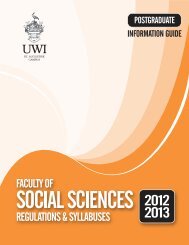Faculty of Humanities and Education (Postgraduate) - The University ...
Faculty of Humanities and Education (Postgraduate) - The University ...
Faculty of Humanities and Education (Postgraduate) - The University ...
Create successful ePaper yourself
Turn your PDF publications into a flip-book with our unique Google optimized e-Paper software.
104<br />
POSTGRADUATE REGULATIONS & SYLLABUSES 2012 - 2013<br />
THE FACULTY OF HUMANITIES & EDUCATION<br />
YEAR:<br />
SEMESTER:<br />
COURSE CODE: EDRL 6005<br />
COURSE TITLE: SETTING UP SCHOOL-BASED READING<br />
PROGRAMMES<br />
NUMBER OF CREDITS: 4<br />
COURSE DESCRIPTION: This course, Setting up School-based<br />
Reading Programmes, is, as its name suggests, essentially<br />
about the establishment <strong>of</strong> reading programmes in the<br />
schools <strong>of</strong> Trinidad <strong>and</strong> Tobago, using conditions in the latter<br />
as a critical basis in addition to insights gleaned from relevant<br />
research in other jurisdictions. It will explore topics such<br />
as reviewing reading programmes; targeting <strong>and</strong> pr<strong>of</strong>iling<br />
students; differentiating instruction; formulating a schoolbased<br />
reading policy; evaluating, selecting, <strong>and</strong> designing<br />
instructional materials; communicating with parents/guardians;<br />
<strong>and</strong> mentoring non-specialist teachers. <strong>The</strong>se topics will be<br />
addressed through various strategies, including interactive<br />
lectures, demonstration workshops, online discussion forums,<br />
webcasts, podcasts, <strong>and</strong> individual <strong>and</strong> group presentations.<br />
<strong>The</strong> course aims to equip the participants with the knowledge,<br />
skills, <strong>and</strong> attitude necessary for establishing <strong>and</strong> overseeing<br />
reading programmes.<br />
Prior to taking this course, participants must complete the<br />
following four (4) courses: <strong>The</strong>oretical Foundations <strong>of</strong> Reading<br />
Instruction, Reading Diagnosis, Intervention, <strong>and</strong> assessment,<br />
ICT for Reading, <strong>and</strong> Teaching Reading in the content Areas, all<br />
<strong>of</strong> which are Year 1 courses that provide the content basis for<br />
exploration <strong>of</strong> the foci mentioned above.<br />
CONTENT<br />
Content is divided into Foundations <strong>and</strong> Practice. Under<br />
Foundations, the following four units will be addressed:<br />
• <strong>The</strong> nature <strong>of</strong> school-based reading programmes<br />
• Reading policies <strong>and</strong> programme perspectives<br />
• Reading programme models (secondary education)<br />
• Specification for Designing Reading Programmes.<br />
Under Practice, the following unit will be addressed:<br />
Evaluating reading programmes.<br />
General Objectives<br />
In order to achieve these goals, the participants will:<br />
• Examine intervention reading programmes <strong>and</strong> identify<br />
their effective features.<br />
• Identify common issues <strong>and</strong> challenges in setting up<br />
school-based reading programmes.<br />
• Explore various philosophies that have guided reading<br />
programme policies <strong>and</strong> link particular perspectives to<br />
reading programme types.<br />
• Compare various models <strong>of</strong> reading programme<br />
development.<br />
• Devise a reading policy for their school using a researchbased<br />
perspective.<br />
• Explore specifications/st<strong>and</strong>ards for designing reading<br />
programmes <strong>and</strong> use them to design a programme for<br />
their school.<br />
• Evaluate reading programmes for suitability to local<br />
situations.<br />
Course Assessment<br />
<strong>The</strong> assessment for this course comprises coursework only<br />
(100%), broken down as follows: programme planning (60%)<br />
<strong>and</strong> programme evaluation (40%).<br />
Resources<br />
Allington, R. L. (2006). Critical factors in designing an effective<br />
reading intervention for struggling readers. In C. Cummins<br />
(ed.), Underst<strong>and</strong>ing <strong>and</strong> implementing Reading First<br />
initiatives: <strong>The</strong> changing role <strong>of</strong> administrators, pp. 127-138.<br />
Retrieved April 22, 2009, from http://teachersread.net/pdf/<br />
ImplementRFCH.pdf.<br />
Anderson, L.A., Benson, E.P. (1960). Setting up a reading clinic.<br />
Peabody Journal <strong>of</strong> <strong>Education</strong>, 37(5), 274-280.<br />
Cuevas, P., Schumm, J.S., Mits-Cash, M., & Pilonieta, P. (2006).<br />
Reading clinics in the U.S.: A national survey <strong>of</strong> present<br />
practice. Journal <strong>of</strong> Reading <strong>Education</strong>, 31(2), 5-12.<br />
Duncan-Owens, D. (2009). Scripted reading programs: Fishing<br />
for success. Principal, 88(3), 26-29.<br />
Dunston, P.J. (2007). Instructional practices, struggling readers,<br />
<strong>and</strong> a university-based reading clinic. Journal <strong>of</strong> Adolescent<br />
<strong>and</strong> Adult Literacy, 50(5), 328-36.<br />
Early, M. J. (1969). What does research in reading reveal about<br />
successful reading? programs? <strong>The</strong> English Journal, 58(4),<br />
534-547.<br />
Grissom, L.V. (1961). Characteristics <strong>of</strong> successful reading<br />
improvement programs.<strong>The</strong> English Journal, 50(7), 461-474.<br />
Hill, D. R. (1997). Setting up an extensive reading programme:<br />
Practical tips. <strong>The</strong> Language Teacher Online. Retrieved from<br />
http://www.jalt-spublications.org/tlt/files/97/may/hill.html.<br />
H<strong>of</strong>fman, J.V., & Rutherford, W.L. (1984). Effective reading<br />
programs: A critical review <strong>of</strong> outlier studies. Reading<br />
Research Quarterly, 20(1), 79-92.<br />
Jensen, D.A., & Tuten, J.A. (2007). From reading clinic to reading<br />
community. Reading Horizons Journal, 47(4), 295-313.<br />
Jensen, D.A., & Tuten, J.A. (2008). Re-visioning the reading clinic<br />
experience: Tutoring at the edge <strong>of</strong> one’s comfort zone.<br />
Journal <strong>of</strong> Reading <strong>Education</strong>, 34(1), 25-32.<br />
Johns, J.L. (1992). From traditional reading clinics to wellness<br />
centers. Eric Document ED349 544, CS011 034.<br />
Just Read Florida. (n.d.). Reading programme specifications.<br />
Retrieved April 22, 2009 from http://www.justreadflorida.<br />
com/docs/reading_program.pdf.<br />
Kame’enui,E.J.,& Simmons,D.C.(2000).Planning <strong>and</strong> evaluation<br />
tool for effective school wide reading programs. Institute<br />
for the Development <strong>of</strong> <strong>Education</strong>al Achievement.<br />
NCATE. (1955). Reading clinics: How they operate <strong>and</strong> what they<br />
accomplish: Panel discussion No. 8. College Composition<br />
<strong>and</strong> Communication, 6(3), 174-176.<br />
Schacter, J. (n.d.) Reading programs that work. Retrieved April<br />
22, 2009 from http://www.mff.org/pubs/ME279.pdf.<br />
Slavin, R.E., Cheung, A., Gr<strong>of</strong>f, C., & Lake, C. (2008). Effective reading<br />
programs for middle <strong>and</strong> high schools: A best-evidence<br />
synthesis. Reading Research Quarterly, 43(3), 290 – 322.<br />
Walmsley, S. A. (1981). On the purpose <strong>and</strong> Content <strong>of</strong> secondary<br />
reading programs: An educational ideological perspective.<br />
Curriculum Inquiry, 11(1), 73-93.

















